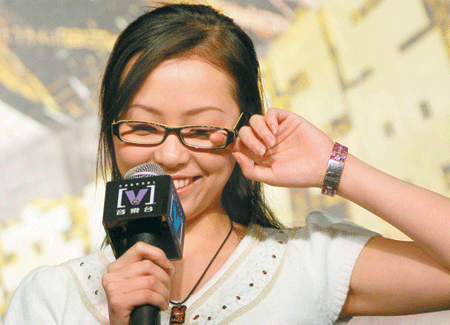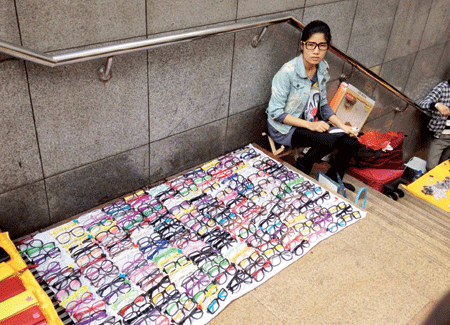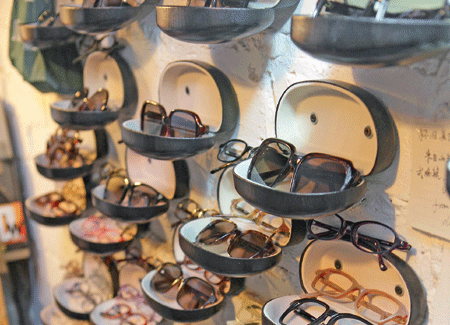Framing the question
Updated: 2012-03-05 08:09
By Tiffany Tan (China Daily)
|
||||||||
 |
|
Pop singer Zhang Liangying wears lens-less glasses at an event in Shanghai. [Fuochi / CFP] |
 |
|
A street vendor sells lens-less glasses in Xiamen, Fujian province. [Natalie Tan / for China Daily] |
 |
|
Lens-less glasses are sold in a store in Shanghai. [YY / CFP] |
Glasses without lenses are big in China, but are they focused fashion or hollow style statements? Tiffany Tan reports.
Surrounded by shiny leather bags with the overlapping L and V monogram, Wang Yanzhu looks like your typical Chinese fashionista on a shopping trip. The 27-year-old is dressed in a brownish orange poncho, her chin-length hair is in a headband and a dark brown leather satchel dangles from her forearm. To complete the look, she decided that morning to slip on a pair of big, translucent, orange plastic glasses - well, frames to be exact, since there's only air where the lenses should be. She has 10 more such frames sitting at home.
Wang, like many Chinese urbanites in Hong Kong, Taiwan and the mainland, uses these empty plastic frames as fashion accessories and beauty aids.
"Lens-less glasses can project many different styles and go with various looks," says the Beijing resident, who works in makeup sales.
After a friend gave Wang her first pair four years ago, she began wearing them regularly, because she is drawn to the seeming refinement of women in glasses, she says.
"They also provide coverage when you're not wearing any makeup," she says.
In a country where a third of the population of 1.3 billion is nearsighted, Wang is blessed with perfect vision and has no need for glasses.
Children tell her big plastic frames look old-fashioned. Older people say they obstruct her "beautiful eyes".
Her boyfriend teases that they make her eyes appear too big. Her mother plainly says they don't suit her.
Welcome to the polarizing trend of wearing glasses without glasses.
Since 2008, the practice has become popular among mainland Chinese college students and yuppies, but it has also been an object of jokes and ridicule. Style professionals are divided on its cool factor.
Clement Buyi Z, a Shanghai-based stylist whose Clement & Clement Production has worked with Chinese fashion and lifestyle magazines like Harper's Bazaar and Modern Weekly, agrees that the frames are versatile tools.
"The glasses can help people achieve different styles and can change the way your face looks," he says, describing such eyewear as a "key accessory with magic".
But he cautions against blindly following trends. "Just be who you are," he says. "Find styles that suit you, and create your own."
American stylist Nels Frye is blunter. The Beijing street fashion blogger and editor-in-chief of Lifestyle magazine says few people can pull off wearing "fake" glasses.
"It takes real style to do that," he says.
"It takes a sort of indignant style. You're deliberately being cheeky. You're challenging the notion of what is authentic and what is fake, and you're commenting on that."
Frye says he understands the motivation of people who regard the frames as a beauty aid - to, say, distract attention from eye bags or to make a long face seem smaller. But on the whole, he finds the trend "lame".
Many believe China adopted the trend from Japan and South Korea, like it has done with hairstyles and clothing over the years. But in this case, fashion experts say, the influences were entirely Chinese beauty and brains.
In 2005, some film and fashion celebrities on the mainland began wearing big, black glasses - a novelty that caught the public's attention. During the same period, the "nerd" subculture entered the mainstream, and the group's signature big, black glasses became synonymous with intelligence and hard work.
"Over time, people began removing the lenses from these black frames," says Liang Yan, a design teacher at the Beijing Institute of Fashion Technology and a judge on Creative Sky, China's version of the US reality TV show Project Runway.
"Many of the earliest lens-less glasses were black. It was not until 2008, when they exploded on the mainland, that the frames came out in different colors."
It's been four years since empty frames became big in urban China, and they show no signs of disappearing. Part of the reason, Liang says, is that they "have been integrated into people's self-identity".
The latest frame models, believe it or not, are inspired by feline cartoon characters. The Hello Kitty ones, which come in plain colors, polka dots and turquoise shell, feature a small bow on the top left. The scale-like protrusions on the sides mimic cat whiskers.
Then there are the Garfield frames, which have drooping "cat's ears" on top and small holes to represent the ear canal.
The all-time best sellers?
"These ones," a shopkeeper in Beijing's Xidan shopping district says, holding out black, rectangular plastic frames, some with neon-colored stems.
But why take out the lenses and risk being called a phony? After all, there are non-prescription lenses for people who don't need help seeing.
They do not want to deal with dirt, fog or reflections on their lenses, interviewees say.
Hu Danying, 19, is very nearsighted and has prescription glasses. But every day, whenever she steps out of her college dorm, she sports lens-less frames over silver-gray contact lenses. The effort seems redundant, but the film and TV animation student wants it no other way.
"Regular glasses don't look good on me," she says. "They bring down my self-confidence. Now people around me say I look really cute."
You can contact the writer at tiffany@chinadaily.com.cn.

 Relief reaches isolated village
Relief reaches isolated village
 Rainfall poses new threats to quake-hit region
Rainfall poses new threats to quake-hit region
 Funerals begin for Boston bombing victims
Funerals begin for Boston bombing victims
 Quake takeaway from China's Air Force
Quake takeaway from China's Air Force
 Obama celebrates young inventors at science fair
Obama celebrates young inventors at science fair
 Earth Day marked around the world
Earth Day marked around the world
 Volunteer team helping students find sense of normalcy
Volunteer team helping students find sense of normalcy
 Ethnic groups quick to join rescue efforts
Ethnic groups quick to join rescue efforts
Most Viewed
Editor's Picks

|

|

|

|

|

|
Today's Top News
Health new priority for quake zone
Xi meets US top military officer
Japan's boats driven out of Diaoyu
China mulls online shopping legislation
Bird flu death toll rises to 22
Putin appoints new ambassador to China
Japanese ships blocked from Diaoyu Islands
Inspired by Guan, more Chinese pick up golf
US Weekly

|

|






